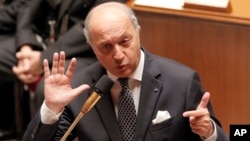DAKAR, SENEGAL —
French Foreign Minister Laurent Fabius says France will be sending more troops to the Central African Republic [CAR] to help African efforts to stabilize the country. France's top diplomat was in and out of Bangui in a matter of hours, but his remarks signaled deeper French engagement to come in the CAR by the end of the year.
France spearheaded the U.N. Security Council resolution passed last week to support the multinational African Union force still deploying to the country that has been in chaos since the Seleka rebel takeover in March.
More resolutions are expected, including one that would transform the African force into a U.N. peacekeeping mission.
Fabius said the regional African force is growing from 2,100 to 3,500 soldiers. He said France also will send additional troops and will take on a more active role in security operations in accordance with Security Council decisions.
He said this regional force "must have the capacity to act and France is going to help." He said France currently has 410 soldiers in the Central African Republic, and those troops are "charged primarily with protecting the airport and patrolling in Bangui." He said with upcoming U.N. resolutions, though, "these different forces will be able to intervene more quickly and effectively."
African troops have been in the CAR since the rebellion began in the north last December, but they have been concentrated in the capital and have been largely unable to prevent looting and protect civilians.
French troops have focused on protecting France's interests in its former colony.
Violence, including widespread looting, has forced 400,000 civilians to flee their homes this year. Clashes and revenge attacks involving rebel fighters and self-defense militias in the provinces have killed dozens since the beginning of September.
Fabius said there would be no impunity for those committing abuses. He said the Seleka rebel coalition was dissolved in September and "that dissolution should take effect, meaning there should not be armed groups roaming around Bangui or the countryside."
Fabius said elections must take place as planned in early 2015. He said interim prime minister, Nicolas Tiangaye, and Seleka rebel leader turned interim president, Michel Djotodia, will not be running.
Jose Richard Pouambi contributed to this report from Bangui.
France spearheaded the U.N. Security Council resolution passed last week to support the multinational African Union force still deploying to the country that has been in chaos since the Seleka rebel takeover in March.
More resolutions are expected, including one that would transform the African force into a U.N. peacekeeping mission.
Fabius said the regional African force is growing from 2,100 to 3,500 soldiers. He said France also will send additional troops and will take on a more active role in security operations in accordance with Security Council decisions.
He said this regional force "must have the capacity to act and France is going to help." He said France currently has 410 soldiers in the Central African Republic, and those troops are "charged primarily with protecting the airport and patrolling in Bangui." He said with upcoming U.N. resolutions, though, "these different forces will be able to intervene more quickly and effectively."
African troops have been in the CAR since the rebellion began in the north last December, but they have been concentrated in the capital and have been largely unable to prevent looting and protect civilians.
French troops have focused on protecting France's interests in its former colony.
Violence, including widespread looting, has forced 400,000 civilians to flee their homes this year. Clashes and revenge attacks involving rebel fighters and self-defense militias in the provinces have killed dozens since the beginning of September.
Fabius said there would be no impunity for those committing abuses. He said the Seleka rebel coalition was dissolved in September and "that dissolution should take effect, meaning there should not be armed groups roaming around Bangui or the countryside."
Fabius said elections must take place as planned in early 2015. He said interim prime minister, Nicolas Tiangaye, and Seleka rebel leader turned interim president, Michel Djotodia, will not be running.
Jose Richard Pouambi contributed to this report from Bangui.









